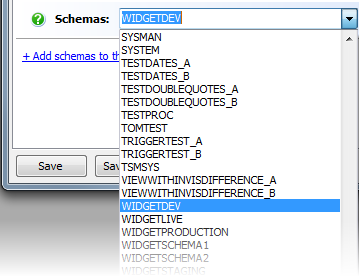Permissions required to use Schema Compare for Oracle
Published 26 July 2017
Selecting schemas to compare
On the Project Configuration dialog box, all schemas in a database are available to select from the Schemas list:
You don't require any privileges to select schemas for comparison.
Comparing schemas
If you are not the owner of the schemas you want to compare, the following privileges are required to compare objects:
- Non-PL/SQL objects (for example TABLES, VIEWS, SYNONYMS) require the
SELECTprivilege - PL/SQL objects (for example PROCEDURES, FUNCTIONS, PACKAGES) require the
EXECUTEprivilege
If you have insufficient privileges to compare an object, it isn't displayed in the comparison results.
Deployment
To run a deployment script created by Schema Compare for Oracle, the following system privileges may be required:
ALTER <OBJECT TYPE>orALTER ANY <OBJECT TYPE>to alter objects
For example,ALTER ANY PROCEDURECREATE <OBJECT TYPE>orCREATE ANY <OBJECT TYPE>to create objects
For example,ALTER INDEXDROP <OBJECT TYPE>orDROP ANY <OBJECT TYPE>to drop objects
For example,DROP TABLEGRANT GRANT ANY OBJECT PRIVILEGE
- If you have insufficient privileges to perform the actions in the deployment script, the script will fail.
- To deploy using Schema Compare for Oracle, we recommended you have DBA privileges.
- If you create a deployment script to run later, we recommended you run the script as the schema owner.
Further Information
Users may experience an Oracle error ORA-00942 when attempting to perform a comparison that informs that a Table or View does not exist. This may indicate that the user account specified to connect to the Oracle database does not have security permissions to read the Oracle Data Dictionary and other system objects.
When performing a comparison, the comparison engine queries Oracle Data Dictionaries. It will first attempt to connect using dba_<data dictionary name>, for example dba_tables. If this fails, the comparison engine automatically switches to use the all_<data dictionary name>, for example all_tables.
Below is a list off all data dictionary views (or their all_ equivalents) that the comparison engine requires security privileges to:
dba_attribute_transformations | dba_clu_columns |
dba_cluster_hash_expressions | dba_clustering_dimensions |
dba_clustering_keys | dba_clustering_tables |
dba_col_comments | dba_col_privs |
dba_cons_columns | dba_cons_obj_columns |
dba_constraints | dba_db_links |
dba_dependencies | dba_du_columns |
dba_external_locations | dba_external_tables |
dba_ind_columns | dba_ind_partitions |
dba_ind_subpartitions | dba_indexes |
dba_indextype_comments | dba_indextype_operators |
dba_indextypes | dba_join_ind_columns |
dba_lob_partitions | dba_lob_subpartitions |
dba_lobs | dba_log_group_columns |
dba_log_groups | dba_mview_comments |
dba_mview_logs | dba_mviews |
dba_nested_table_cols | dba_nested_tables |
dba_obj_colattrs | dba_objects |
dba_opancillary | dba_oparguments |
dba_opbindings | dba_operator_comments |
dba_operators | dba_part_indexes |
dba_part_key_columns | dba_part_tables |
dba_queue_subscribers | dba_queue_tables |
dba_queues | dba_refs |
dba_role_privs | dba_sequences |
dba_snapshots | dba_source |
dba_subpart_key_columns | dba_subpartition_templates |
dba_synonyms | dba_sys_privs |
dba_tab_cols | dba_tab_comments |
dba_tab_partitions | dba_tab_privs |
dba_tab_subpartitions | dba_tables |
dba_triggers | dba_types |
dba_users | dba_varrays |
dba_views |
|
The comparison engine will query the following system tables, for example the sys.snap$ table is used to obtain information on the Materialized Views Reduced Precisions:
all_users | m_owners |
sys_ilm$ | sys_ilmobjects |
sys.objects$ | sys.snap$ |
sys.sys_fba_period | sys.tab$ |
If after granting select on all_objects to your user or signing in as a different (perhaps dba) user you still get the same problem you may have to check your user’s access to each of these.





